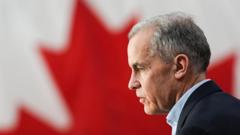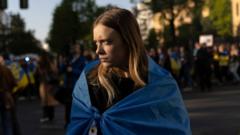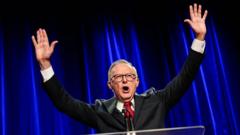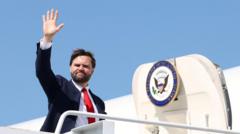Today's election outcomes could reshape Romania's political landscape, with the nation closely watched by international powers.
**Romania Faces Pivotal Presidential Election as Transparency Concerns Linger**
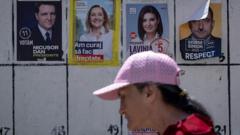
**Romania Faces Pivotal Presidential Election as Transparency Concerns Linger**
After a previously annulled election, Romanians return to the polls amidst allegations of fraud and external interference.
Romanians are gearing up to cast their votes today in a rerun of the presidential election, following a tumultuous first attempt that ended in controversy six months ago. The initial vote, held on November 24, saw radical outsider Calin Georgescu, known for his mystical views, emerge as the frontrunner. However, the results were annulled amidst serious allegations of campaign fraud and claims of Russian interference in the electoral process.
The political fallout from the annulment attracted severe criticism from US Vice President JD Vance in February, creating waves in a Romanian political landscape that heavily relies on its ties with the United States. Nonetheless, Georgescu will not be on the ballot in today’s election.
The watchful eyes of European capitals and Washington are locked onto this vote, where nationalist candidate George Simion leads the competition against three centrist candidates: Nicusor Dan, the popular mayor of Bucharest; Crin Antonescu, a liberal affiliated with the ruling Social-Democrat and National Liberal coalition; and independent candidate Elena Lasconi. A total of seven candidates will contest this election, with a potential run-off set for May 18 if no candidate garners more than 50% of the votes.
Simion, leader of the Alliance for the Union of Romanians (AUR), framed the election as a battle for the Romanian identity, conveying a narrative of resilience against past grievances. Recent opinion polls, though often unreliable, hint at his competitive advantage. However, political analysts suggest that he faces a tough challenge from either Nicusor Dan or Crin Antonescu should a run-off be needed.
Strategically, Romania's role in supporting Ukraine during the ongoing conflict sees its political dynamics take on added critical importance. The country serves as a vital corridor for arms and humanitarian assistance, hosts a US missile defense shield, and maintains NATO airbases that monitor regional security. Consequently, discussions surrounding the elections, especially if Simion were to win, include anxieties about continued support for Ukraine, as expressed by security experts.
Public sentiment surrounding Romania's financial support for Ukrainian refugees has featured prominently in Simion's campaign messaging, although he insists he does not harbor pro-Russian sentiments. The pleasant May afternoon of the election marked a stark contrast to the political tension, as the Cotroceni Palace, the residence of the Romanian presidency, became a popular site for citizens.
Among the visitors, opinions varied, reflecting the complex political landscape. Ionut, a satirical writer, who once backed Simion out of frustration with political delays, indicated a shift in his support towards Nicusor Dan as political tensions have eased. On the other hand, Ana, a management consultant, emphasized her desire for both continuity in international relations and systemic change against corruption, revealing a desire for renewed political engagement among younger Romanians.
With a substantial diaspora ready to vote, accounting for one million registered voters abroad, the election is set to unveil a dynamic political scene in Romania, with the potential to influence its future direction.
The political fallout from the annulment attracted severe criticism from US Vice President JD Vance in February, creating waves in a Romanian political landscape that heavily relies on its ties with the United States. Nonetheless, Georgescu will not be on the ballot in today’s election.
The watchful eyes of European capitals and Washington are locked onto this vote, where nationalist candidate George Simion leads the competition against three centrist candidates: Nicusor Dan, the popular mayor of Bucharest; Crin Antonescu, a liberal affiliated with the ruling Social-Democrat and National Liberal coalition; and independent candidate Elena Lasconi. A total of seven candidates will contest this election, with a potential run-off set for May 18 if no candidate garners more than 50% of the votes.
Simion, leader of the Alliance for the Union of Romanians (AUR), framed the election as a battle for the Romanian identity, conveying a narrative of resilience against past grievances. Recent opinion polls, though often unreliable, hint at his competitive advantage. However, political analysts suggest that he faces a tough challenge from either Nicusor Dan or Crin Antonescu should a run-off be needed.
Strategically, Romania's role in supporting Ukraine during the ongoing conflict sees its political dynamics take on added critical importance. The country serves as a vital corridor for arms and humanitarian assistance, hosts a US missile defense shield, and maintains NATO airbases that monitor regional security. Consequently, discussions surrounding the elections, especially if Simion were to win, include anxieties about continued support for Ukraine, as expressed by security experts.
Public sentiment surrounding Romania's financial support for Ukrainian refugees has featured prominently in Simion's campaign messaging, although he insists he does not harbor pro-Russian sentiments. The pleasant May afternoon of the election marked a stark contrast to the political tension, as the Cotroceni Palace, the residence of the Romanian presidency, became a popular site for citizens.
Among the visitors, opinions varied, reflecting the complex political landscape. Ionut, a satirical writer, who once backed Simion out of frustration with political delays, indicated a shift in his support towards Nicusor Dan as political tensions have eased. On the other hand, Ana, a management consultant, emphasized her desire for both continuity in international relations and systemic change against corruption, revealing a desire for renewed political engagement among younger Romanians.
With a substantial diaspora ready to vote, accounting for one million registered voters abroad, the election is set to unveil a dynamic political scene in Romania, with the potential to influence its future direction.

